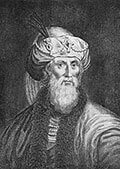the Fourth Week after Epiphany
Click here to join the effort!
Historical Writings
B.C. (Before Christ)
Writings of Flavius Josephus
Against Apion
Antiquities of the Jews
Discourse to the Greeks concerning Hades
The History of the Jewish War

Flavius Josephus
He was born Joseph ben Mattathias in Jerusalem in 37 CE a few years after the time of Jesus, during the time of the Roman occupation of the Jewish homeland. In his early twenties he was sent to Rome to negotiate the release of several priests held hostage by Emperor Nero. When he returned home after completing his mission he found the nation beginning a revolution against the Romans.
Despite his foreboding that the cause was hopeless, he was drafted into becoming commander of the revolutionary forces in Galilee, where he spent more time controlling internal factions than fighting the Roman army. When the city of Jotapata he was defending fell to the Roman general Vespasian, Josephus and his supporters hid in a cave and entered into a suicide pact, which Josephus oddly survived.
Taken prisoner by Vespasian, Josephus presented himself as a prophet. Noting that the war had been propelled by an ancient oracle that foretold a world ruler would arise from Judaea, Josephus asserted that this referred to Vespasian, who was destined to become Emperor of Rome. Intrigued, Vespasian spared his life. When this prophecy came true, and Vespasian became Emperor, he rewarded Josephus handsomely, freeing him from his chains and eventually adopting him into his family, the Flavians. Josephus thus became Flavius Josephus.
During the remainder of the war, Josephus assisted the Roman commander Titus, Vespasian's son, with understanding the Jewish nation and in negotiating with the revolutionaries. Called a traitor, he was unable to persuade the defenders of Jerusalem to surrender to the Roman siege, and instead became a witness to the destruction of the city and the Holy Temple.
Living at the Flavian court in Rome, Josephus undertook to write a history of the war he had witnessed. The work, while apparently factually correct, also served to flatter his patron and to warn other provinces against the folly of opposing the Romans. He first wrote in his native language of Aramaic, then with assistance translated it into Greek (the most-used language of the Empire). It was published a few years after the end of the war, in about 78 CE. He was about 40 years old.
Josephus subsequently improved his language skills and undertook a massive work in Greek explaining the history of the Jews to the general non-Jewish audience. He emphasized that the Jewish culture and Bible were older than any other then existing, hence called his work the Jewish Antiquities. Approximately half the work is a rephrasing of the Hebrew Bible, while much of the rest draws on previous historians. This work was published in 93 or 94 CE, when he was about 56 years old.
Josephus wrote at least two smaller books, including his autobiography, in which he recounts his life from birth until the writing of the Antiquities. The year he died is unknown.